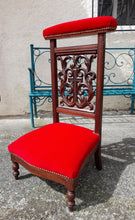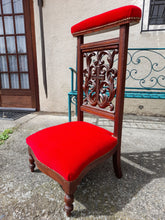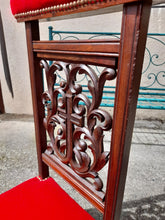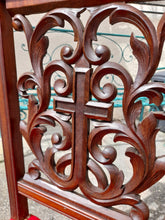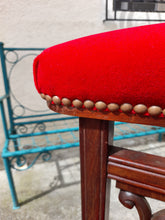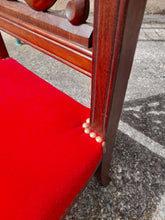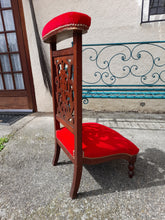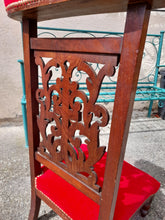
Antique Prayer Chair From Lourdes, Walnut French Prie Dieu, Circa 1860, Beautiful Condition, Professionally Restored
This lovely elegant prayer chair, or prie dieu, as it is called in France, has been professionally recovered and is in excellent condition.
I comes from a 'Maison de Maitre' situated in the famous town of Lourdes in South West France.
The chair stands 88 centimetres tall, is 46 centimetres wide and 42 centimetres deep.
It is made from a lovely walnut and has been stunningly carved in the tradituonal style of the Napoleonic era of France.
Since the middle ages the Christian faithful have been attending services organised by their parishes.
From the 16th century onwards it became customary to have a row of wooden banks or chairs in the front row of the church which were rented out to the tenant farmers. The prices for these seats were fixed, although increased in price during solemn masses. A dedicated individual known as the Chaisier (person of the chairs) was designated to collect the dues for the chairs.
It was not until the Second Vatican Council in 1962 that these Prie Dieu or Prayer Chairs were gradually replaced by simple wooden chairs or pews and the replacement of kneeling with standing during the key moments of the liturgy.
Prior to this it was customary for notables of the parish to have ownership of their own prayer chairs in the front row of the church and often these would have their names engraved on a copper plate or enamelled on the front or rear of the chair. If these chairs were not reserved by their owners, the church could rent them out.
The lower ranks of parishioners either remained standing during the service or they knelt on the ground. The prayer chair became a true marker of the social geography of the parish and degree of piety between those who rested their heads in their hands and those who crossed their arms. Some prayer chairs had rings attached to the sides to accommodate an umbrella.
To this day many prayer chairs are arranged in churches and used by their owners, particularly during solemn masses. It is also customary for the bride and groom to kneel on a prayer chair during the religious marriage ceremony.
Prayer chairs were usually covered in velvet or silk and sometimes would carry the coat of arms of the owner. On special occasions they would be covered with a cushion which marked the rank of the person using it. Green cloth for a bishop, red for a cardinal or violet for both. This beautiful chair has been recovered to match the original red.
There are a variety of Prie Dieux in different countries. Originally a simple desk style with a kneeler, or just the kneeler, but as time has gone by they have become more and more ornate.
The prayer chair itself has many variations. From plain soft wood with no covering to simple pine chair with a woven rush seat that lifts to reveal the kneeler below. This was a very popular version in the 18th and 19th century as a domestic place of devotion for those of a more modest income as they could also be used as a normal chair.
As mentioned before, coats of arms were added, the carving of the chair itself was placed in the hands of wonderfully skilled craftsmen. For form and colour rarer woods were used. Tapestries were woven specifically to cover the seat and arm rest of the chairs in beautiful colours and designs.
Two Prie Dieux were arranged at the foot of the coffin of President John F Kennedy, who was of course, Catholic.
This lovely elegant prayer chair, or prie dieu, as it is called in France, has been professionally recovered and is in excellent condition.
I comes from a 'Maison de Maitre' situated in the famous town of Lourdes in South West France.
The chair stands 88 centimetres tall, is 46 centimetres wide and 42 centimetres deep.
It is made from a lovely walnut and has been stunningly carved in the tradituonal style of the Napoleonic era of France.
Since the middle ages the Christian faithful have been attending services organised by their parishes.
From the 16th century onwards it became customary to have a row of wooden banks or chairs in the front row of the church which were rented out to the tenant farmers. The prices for these seats were fixed, although increased in price during solemn masses. A dedicated individual known as the Chaisier (person of the chairs) was designated to collect the dues for the chairs.
It was not until the Second Vatican Council in 1962 that these Prie Dieu or Prayer Chairs were gradually replaced by simple wooden chairs or pews and the replacement of kneeling with standing during the key moments of the liturgy.
Prior to this it was customary for notables of the parish to have ownership of their own prayer chairs in the front row of the church and often these would have their names engraved on a copper plate or enamelled on the front or rear of the chair. If these chairs were not reserved by their owners, the church could rent them out.
The lower ranks of parishioners either remained standing during the service or they knelt on the ground. The prayer chair became a true marker of the social geography of the parish and degree of piety between those who rested their heads in their hands and those who crossed their arms. Some prayer chairs had rings attached to the sides to accommodate an umbrella.
To this day many prayer chairs are arranged in churches and used by their owners, particularly during solemn masses. It is also customary for the bride and groom to kneel on a prayer chair during the religious marriage ceremony.
Prayer chairs were usually covered in velvet or silk and sometimes would carry the coat of arms of the owner. On special occasions they would be covered with a cushion which marked the rank of the person using it. Green cloth for a bishop, red for a cardinal or violet for both. This beautiful chair has been recovered to match the original red.
There are a variety of Prie Dieux in different countries. Originally a simple desk style with a kneeler, or just the kneeler, but as time has gone by they have become more and more ornate.
The prayer chair itself has many variations. From plain soft wood with no covering to simple pine chair with a woven rush seat that lifts to reveal the kneeler below. This was a very popular version in the 18th and 19th century as a domestic place of devotion for those of a more modest income as they could also be used as a normal chair.
As mentioned before, coats of arms were added, the carving of the chair itself was placed in the hands of wonderfully skilled craftsmen. For form and colour rarer woods were used. Tapestries were woven specifically to cover the seat and arm rest of the chairs in beautiful colours and designs.
Two Prie Dieux were arranged at the foot of the coffin of President John F Kennedy, who was of course, Catholic.








